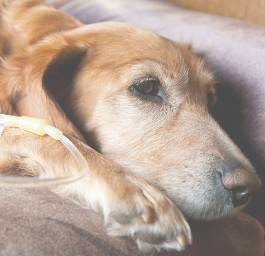
About the Hemangiosarcoma Research Initiative
Hemangiosarcoma is an aggressive and common cancer in dogs. It can develop in any tissue or organ, but most commonly affects the spleen, right atrium of the heart, and the skin.
Since 1995, CHF and its donors have invested over $4.8 million in 33 grants in understanding mechanisms and causes, new targets for treatment, and early diagnostics for canine hemangiosarcoma, an aggressive cancer in dogs. CHF, along with its donors, continues to address this devastating disease through this initiative launched in 2018.
$4.8M invested in hemangiosarcoma research since 1995.
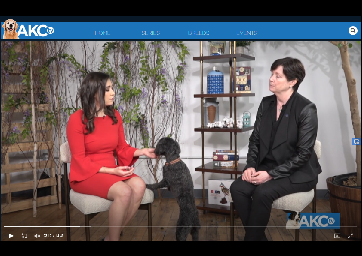
Learn More about the Initiative
Learn more about the Hemangiosarcoma Research Initiative by watching the January 9, 2019 AKC.TV Ask the Expert interview with AKC Canine Health Foundation former CEO, Dr. Diane Brown.
View moreWhy Study It?
- While cutaneous masses (affecting the skin) are often treatable by tumor excision, tumors affecting internal organs are associated with poorer prognosis and are almost always incurable.
- Hemangiosarcoma is often called the “silent killer” because the tumors are often not detected until the later stages of the disease, and even dogs harboring large tumors may show no clinical signs or evidence that they have a life threatening disease.
- Existing treatments have not improved the overall survival times for dogs with this disease.
Our Progress So Far
Current CHF-Funded Studies
The AKC Canine Health Foundation (CHF) believes in the advancement of science to meet the unmet medical needs of the dogs that are such an important part of our daily lives. Here we list the important active studies in this research program area.
| 03286 | Single Nucleus RNA Sequencing of Canine Hemangiosarcoma - A Comparative Study of Splenic, Extra-Splenic, and Metastatic Tumor Profiling for Targeted Therapeutic Development |
| 03187 | Investigating Volatile Organic Compounds as Potential Markers of Canine Hemangiosarcoma by Trained Bio-detection Dogs |
| 03011 | A GD3 Nano-scaled Liposomal Cancer Vaccine Clinical Trial for Canine Hemangiosarcoma |
| 03003 | Suppression of Extracellular Glutamate Efflux & mGluR1 Signaling to Impede Canine Hemangiosarcoma Cell Growth |
| 02946 | Towards Curative Outcomes in Canine Hemangiosarcoma |
| 02806-MOU | Strategic Prevention of Canine Hemangiosarcoma: Lifetime Follow-Up |
| 02534 | Clinical Trial for Evaluation of Propranolol and Doxorubicin in the Treatment of Canine Hemangiosarcoma |
Webinars
|
See what Douglas H. Thamm, VMD, DACVIM (Oncology) has to say about cancer prevention as well as what we know about the connection between the use of vaccines, flea, tick and heartworm preventatives and cancer risk in dogs here. |

|
|
Douglas H. Thamm, VMD, DACVIM (Oncology) updates us on his hemangiosarcoma research, presenting on the clinical presentation, staging, therapy and prognosis in canine hemangiosarcoma. He also talks about his recent findings about the biology of the disease, and early diagnosis and new treatment strategies here. |
Articles
- What Factors Influence Client Decision-Making and Clinical Outcomes for Dogs with Non-Traumatic Hemoabdomen? (04/11/2024)
- Cancer Attributable to Infection? (06/08/2022)
- Effie's Tale (07/01/2021)
- A Fighting Chance Against Hemangiosarcoma (05/26/2021)
- AKC Canine Health Foundation Celebrates Matched Donations for Hemangiosarcoma Research (11/24/2020)
- Rottweiler Update - Spring 2021 - Hemangiosarcoma Research (02/26/2021)
- Golden Retriever Update - Summer 2020 - Hemangiosarcoma & Bartonella (06/08/2020)
Publications
Researchers awarded grants through CHF continue to produce a wealth of publications contributing to scientific knowledge. These scientific articles, grouped by publication date, are a result of CHF-funded hemangiosarcoma research!
- Sarver, A. L., Makielski, K. M., DePauw, T. A., Schulte, A. J., & Modiano, J. F. (2022). Increased risk of cancer in dogs and humans: A consequence of recent extension of lifespan beyond evolutionarily determined limitations? Aging and Cancer. https://doi.org/10.1002/aac2.12046
- Lashnits, E., Neupane, P., Bradley, J. M., Richardson, T., Maggi, R. G., & Breitschwerdt, E. B. (2021). Comparison of Serological and Molecular Assays for Bartonella Species in Dogs with Hemangiosarcoma. Pathogens, 10(7), 794. https://doi.org/10.3390/pathogens10070794
- Borgatti, A., Fieberg, A., Winter, A. L., Stuebner, K., Taras, E., Todhunter, D., Masyr, A., Rendhal, A., Vallera, D. A., Koopmeiners, J. S., & Modiano, J. F. (2020). Impact of Repeated Cycles of EGF Bispecific Angiotoxin (eBAT) Administered at a Reduced Interval from Doxorubicin Chemotherapy in Dogs with Splenic Hemangiosarcoma. Veterinary and Comparative Oncology. https://doi.org/10.1111/vco.12590
- Lashnits, E., Neupane, P., Bradley, J. M., Richardson, T., Thomas, R., Linder, K. E., Breen, M., Maggi, R. G., & Breitschwerdt, E. B. (2020). Molecular prevalence of Bartonella, Babesia, and hemotropic Mycoplasma species in dogs with hemangiosarcoma from across the United States. PLOS ONE, 15(1), e0227234. https://doi.org/10.1371/journal.pone.0227234
- Megquier, K., Turner-Maier, J., Swofford, R., Kim, J.-H., Sarver, A. L., Wang, C., Sakthikumar, S., Johnson, J., Koltookian, M., Lewellen, M., Scott, M. C., Schulte, A. J., Borst, L., Tonomura, N., Alfoldi, J., Painter, C., Thomas, R., Karlsson, E. K., Breen, M., … Lindblad-Toh, K. (2019). Comparative Genomics Reveals Shared Mutational Landscape in Canine Hemangiosarcoma and Human Angiosarcoma. Molecular Cancer Research, 17(12), 2410–2421. https://doi.org/10.1158/1541-7786.MCR-19-0221
- Kennedy, K., Thomas, R., Durrant, J., Jiang, T., Motsinger-Reif, A., & Breen, M. (2019). Genome-wide DNA copy number analysis and targeted transcriptional analysis of canine histiocytic malignancies identifies diagnostic signatures and highlights disruption of spindle assembly complex. Chromosome Research. https://doi.org/10.1007/s10577-019-09606-0
- Kim, J.-H., Frantz, A. M., Sarver, A. L., Gorden Klukas, B. H., Lewellen, M., O’Brien, T. D., Dickerson, E. B., & Modiano, J. F. (2018). Modulation of fatty acid metabolism and immune suppression are features of in vitro tumour sphere formation in ontogenetically distinct dog cancers. Veterinary and Comparative Oncology, 16(1), E176–E184. https://doi.org/10.1111/vco.12368
- Borgatti, A., Koopmeiners, J. S., Sarver, A. L., Winter, A. L., Stuebner, K., Todhunter, D., Rizzardi, A. E., Henriksen, J. C., Schmechel, S., Forster, C. L., Kim, J.-H., Froelich, J., Walz, J., Henson, M. S., Breen, M., Lindblad-Toh, K., Oh, F., Pilbeam, K., Modiano, J. F., & Vallera, D. A. (2017). Safe and Effective Sarcoma Therapy through Bispecific Targeting of EGFR and uPAR. Molecular Cancer Therapeutics, 16(5), 956–965. https://doi.org/10.1158/1535-7163.MCT-16-0637
- Dickerson, E., & Bryan, B. (2015). Beta Adrenergic Signaling: A Targetable Regulator of Angiosarcoma and Hemangiosarcoma. Veterinary Sciences, 2(3), 270–292. https://doi.org/10.3390/vetsci2030270
- Regan, D. P., Escaffi, A., Coy, J., Kurihara, J., & Dow, S. W. (2017). Role of monocyte recruitment in hemangiosarcoma metastasis in dogs: CCL2-recruited monocytes in canine hemangiosarcoma. Veterinary and Comparative Oncology, 15(4), 1309–1322. https://doi.org/10.1111/vco.12272
- Grimes, J. A., Prasad, N., Levy, S., Cattley, R., Lindley, S., Boothe, H. W., Henderson, R. A., & Smith, B. F. (2016). A comparison of microRNA expression profiles from splenic hemangiosarcoma, splenic nodular hyperplasia, and normal spleens of dogs. BMC Veterinary Research, 12(1). https://doi.org/10.1186/s12917-016-0903-5
- Andersen, Nicholas J., Boguslawski, E. B., Kuk, C. Y., Chambers, C. M., & Duesbery, N. S. (2015). Combined inhibition of MEK and mTOR has a synergic effect on angiosarcoma tumorgrafts. International Journal of Oncology, 47(1), 71–80. https://doi.org/10.3892/ijo.2015.2989
- Im, K. S., Graef, A. J., Breen, M., Lindblad-Toh, K., Modiano, J. F., & Kim, J.-H. (2015). Interactions between CXCR4 and CXCL12 promote cell migration and invasion of canine hemangiosarcoma: CXCR4/CXCL12 in HSA migration and invasion. Veterinary and Comparative Oncology, 15(2), 315–327. https://doi.org/10.1111/vco.12165Kim, Jong-Hyuk, Graef, A., Dickerson, E., & Modiano, J. (2015). Pathobiology of Hemangiosarcoma in Dogs: Research Advances and Future Perspectives. Veterinary Sciences, 2(4), 388–405. https://doi.org/10.3390/vetsci2040388
- Rodriguez, A. M., Graef, A. J., LeVine, D. N., Cohen, I. R., Modiano, J. F., & Kim, J.-H. (2015). Association of Sphingosine-1-phosphate (S1P)/S1P Receptor-1 Pathway with Cell Proliferation and Survival in Canine Hemangiosarcoma. Journal of Veterinary Internal Medicine, 29(4), 1088–1097. https://doi.org/10.1111/jvim.13570
- Borgatti, A. (2014). Binding of VEGF-A to canine cancer cells with preferential expression of VEGFR1. Veterinary World, 7(1), 1–6. https://doi.org/10.14202/vetworld.2014.1-6
- Gorden, B. H., Kim, J.-H., Sarver, A. L., Frantz, A. M., Breen, M., Lindblad-Toh, K., O’Brien, T. D., Sharkey, L. C., Modiano, J. F., & Dickerson, E. B. (2014). Identification of Three Molecular and Functional Subtypes in Canine Hemangiosarcoma through Gene Expression Profiling and Progenitor Cell Characterization. The American Journal of Pathology, 184(4), 985–995. https://doi.org/10.1016/j.ajpath.2013.12.025
- Kim, Jong-Hyuk, Frantz, A. M., Anderson, K. L., Graef, A. J., Scott, M. C., Robinson, S., Sharkey, L. C., O׳Brien, T. D., Dickerson, E. B., & Modiano, J. F. (2014). Interleukin-8 promotes canine hemangiosarcoma growth by regulating the tumor microenvironment. Experimental Cell Research, 323(1), 155–164. https://doi.org/10.1016/j.yexcr.2014.02.020
- Koopmeiners, J. S., & Modiano, J. (2014). A Bayesian adaptive Phase I-II clinical trial for evaluating efficacy and toxicity with delayed outcomes. Clinical Trials (London, England), 11(1), 38–48. https://doi.org/10.1177/1740774513500589
- Thomas, R., Borst, L., Rotroff, D., Motsinger-Reif, A., Lindblad-Toh, K., Modiano, J. F., & Breen, M. (2014). Genomic profiling reveals extensive heterogeneity in somatic DNA copy number aberrations of canine hemangiosarcoma. Chromosome Research, 22(3), 305–319. https://doi.org/10.1007/s10577-014-9406-z
- Andersen, N. J., Nickoloff, B. J., Dykema, K. J., Boguslawski, E. A., Krivochenitser, R. I., Froman, R. E., Dawes, M. J., Baker, L. H., Thomas, D. G., Kamstock, D. A., Kitchell, B. E., Furge, K. A., & Duesbery, N. S. (2013). Pharmacologic Inhibition of MEK Signaling Prevents Growth of Canine Hemangiosarcoma. Molecular Cancer Therapeutics, 12(9), 1701–1714. https://doi.org/10.1158/1535-7163.MCT-12-0893
- Kim, J. H., Anderson, K. L., Frantz, A. M., Graef, A. J., Scott, M. C., Sharkey, L. C., ... & Modiano, J. F. (2013). Constitutive expression and roles of interleukin-8 in canine hemangiosarcoma. In BMC proceedings (Vol. 7, No. S2, p. P35). BioMed Central. https://www.ncbi.nlm.nih.gov/pmc/articles/PMC3624508/
- Schappa, J. T., Frantz, A. M., Gorden, B. H., Dickerson, E. B., Vallera, D. A., & Modiano, J. F. (2013). Hemangiosarcoma and its cancer stem cell subpopulation are effectively killed by a toxin targeted through epidermal growth factor and urokinase receptors: Bispecific ligand-targeted toxins. International Journal of Cancer, 133(8), 1936–1944. https://doi.org/10.1002/ijc.28187
- Koopmeiners, J. S., & Modiano, J. F. (2012). Extending the TITE CRM to Multiple Outcomes with Application to a Phase 1 Clinical Trial in Canine Hemangiosarcoma.University of Minnesota. Thesis. https://api.semanticscholar.org/CorpusID:18648350
- Tamburini, B. A., Phang, T. L., Fosmire, S. P., Scott, M. C., Trapp, S. C., Duckett, M. M., Robinson, S. R., Slansky, J. E., Sharkey, L. C., Cutter, G. R., Wojcieszyn, J. W., Bellgrau, D., Gemmill, R. M., Hunter, L. E., & Modiano, J. F. (2010). Gene expression profiling identifies inflammation and angiogenesis as distinguishing features of canine hemangiosarcoma. BMC Cancer, 10(1). https://doi.org/10.1186/1471-2407-10-619
- Tamburini, B. A., Trapp, S., Phang, T. L., Schappa, J. T., Hunter, L. E., & Modiano, J. F. (2009). Gene Expression Profiles of Sporadic Canine Hemangiosarcoma Are Uniquely Associated with Breed. PLoS ONE, 4(5), e5549. https://doi.org/10.1371/journal.pone.0005549Dickerson, E. B., Thomas, R., Fosmire, S. P., Lamerato-Kozicki, A. R., Bianco, S. R., Wojcieszyn, J. W., Breen, M., Helfand, S. C., & Modiano, J. F. (2005). Mutations of Phosphatase and Tensin Homolog Deleted from Chromosome 10 in Canine Hemangiosarcoma. Veterinary Pathology, 42(5), 618–632. https://doi.org/10.1354/vp.42-5-618
- Akhtar, N., Padilla, M. L., Dickerson, E. B., Steinberg, H., Breent, M., Auerbach, R., & Helfand, S. C. (2004). Interleukin-12 Inhibits Tumor Growth in a Novel Angiogenesis Canine Hemangiosarcoma Xenograft Model. Neoplasia, 6(2), 106–116. https://doi.org/10.1593/neo.03334
- Fosmire, S. P., Dickerson, E. B., Scott, A. M., Bianco, S. R., Pettengill, M. J., Meylemans, H., Padilla, M., Frazer-Abel, A. A., Akhtar, N., Getzy, D. M., Wojcieszyn, J., Breen, M., Helfand, S. C., & Modiano, J. F. (2004). Canine malignant hemangiosarcoma as a model of primitive angiogenic endothelium. Laboratory Investigation, 84(5), 562–572. https://doi.org/10.1038/labinvest.3700080
How to Get Involved
Thank you to the Sponsors of the Hemangiosarcoma Research Initiative!
Champion Sponsors ($50,000+)
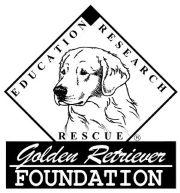
|

|
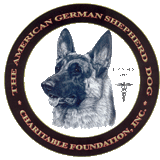
|

|
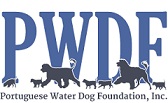
|
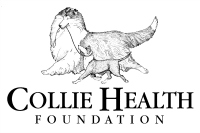
|
Sponsors ($2,500+)
|
Alaskan Malamute Club of America, Inc.
Alice's Fund/Michael Heltzer
American Belgian Tervuren Club, Inc. American Bloodhound Club American Bullmastiff Association
American Pointer Club
Australian Shepherd Health & Genetics Institute, Inc.
Basset Hound Club of America, Inc.Australian Terrier Trust Bedlington Terrier Club of America Bernese Mountain Dog Club of America Bouvier Health Foundation
Briard Club of America Health & Education Trust
Chesapeake Kennel Club of Maryland, Inc.
Chinese Shar-Pei Charitable Trust
Chinese Shar-Pei Club of America, Inc.
Clumber Spaniel Health Foundation Dachshund Club of America, Inc.
Deuces Legacy
Effie and Friends
Field Spaniel Society of America
Flat-Coated Retriever Foundation
French Bulldog Club of America
Friends of Karoo, Murray, and Layla
Golden Retriever Club of San Diego County
German Shorthaired Pointer Club of America, Inc.
German Wirehaired Pointer Club of America
|
Gordon Setter Club of America, Inc.
Great Dane Club of America
Great Pyrenees Club of America
Health & Rescue Foundation of the Petit Basset Griffon Vendeen Club of AmericaIrish Setter Club of America Foundation, Inc.
Irish Setter Club of Milwaukee
Irish Wolfhound Club of America, Inc.
Keeshond Club of America
Labrador Retriever Club, Inc.
Leonberger Health Foundation
Master National Retriever Club Foundation Miranda Fund
National Beagle Club
Nespola Charitable Foundation
Newfoundland Club of America Charitable Trust Norwegian Elkhound Association of America, Inc.
Otterhound Club of America
Poodle Club of America Foundation
Rottweiler Health Foundation Saluki Health Research, Inc. Scottish Terrier Club of America Health Trust Fund
SCWTCA Endowment, Inc.
Tibetan Terrier Club of America/Tibetan Terrier Health & Welfare Foundation
Versatility in Poodles, Inc.
Vizsla Club of America Welfare Foundation
Weimaraner Foundation Fund Corporation
|
Help Future Generations of Dogs
Participate in canine health research by providing samples or by enrolling in a clinical trial. Samples are needed from healthy dogs and dogs affected by specific diseases.



